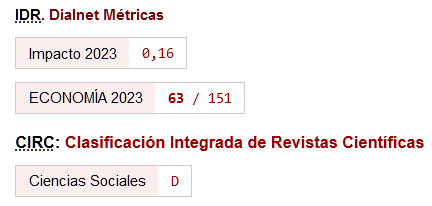Estrategias alternativas en los debates sobre género y desarrollo.
Keywords:
Gender, Development, Empowerment, CapacitiesAbstract
Development policies applied to the peripheral countries explicitly or implicitly contain a vision of the role that women had to play in the development of their countries. After a critical review of the main strategies, the article discusses the alternatives that have been proposed since the 80´s by the women's movement and by those who have had a critical view of the orthodoxy of development, explaining how these strategies contribute to the fight against the subordination of women.
Downloads
References
Agarwal, Bina (1997): ""Bargaining" and Gender Relations: Within and Beyond the Household", Feminist Economics, vol.3 (1), pp. 1-51. https://doi.org/10.1080/135457097338799
Agarwal, Bina (2003): "Gender and Land Rights Revisited: Exploring New Prospects via de State, Family and Market" in Shahra Razavi (ed.) Agrarian Change, Gender and Land Rights, Oxford: UNRISD Blackwell Pub. Ltd., pp. 184-224. https://doi.org/10.1111/1471-0366.00054
Bisnath, Savitri y Elson, Diane (2000): Women's Empowerment Revisited. Background Paper for Progress of the World's Women, A New Biennial Report, UNIFEM. En http://www.undp.org/unifem, 1/3/01.
Buvinic, Mayra (1983): "Women's issues in Third World Poverty: A policy analysis" en Mayra Buvinic, Margaret A. Lycette y William Paul McGreevey (eds.) Women and Poverty in the Third World, Baltimore: The Johns Hopkins University Press, pp. 14-33.
Buvinic, Mayra (1986): "Projects for Women in the Third World: Explaining their Misbehavior", World Development, Vol. 14 - Nº 5, pp. 653-664. https://doi.org/10.1016/0305-750X(86)90130-0
Dema-Moreno, Sandra (2009): "Behind the Negotiations: Financial Decision-Making Processes in Spanish Dual-Income Couples", Feminist Economics, vol. 15 (1), pp. 27-56. https://doi.org/10.1080/13545700802620575
Elson, Diane (1991): Male Bias in the Development Process, Manchester: Manchester University Press.
Kabeer, Naila (1999): "Resources, Agency, Achievements: Reflections on the Measurement of Women's Empowerment", Development and Change, vol. 20, pp. 435-464. https://doi.org/10.1111/1467-7660.00125
Kandiyoti, Deniz (2007): "Political fiction meets gender myth: post-conflict reconstruction, 'democratization' and women's rights" en Andrea Cornwall, Elizabeth Harrison y Ann Whitehead (eds.) Feminisms in development: Contradictions, contestations & challenges, London/New York: Zed Books, pp. 191-200. https://doi.org/10.5040/9781350220089.ch-015
León, Magdalena (comp.) (1997): Poder y empoderamiento de las mujeres, Bogotá: Edit. Tercer Mundo.
Molyneux, Maxine (2002): "Gender and the Silences of Social Capital: Lessons from Latin America", Development and Change, vol. 33(2): 167-188. https://doi.org/10.1111/1467-7660.00246
Molyneux, Maxine (2007): "The chimera of success: gender ennui and the changed international policy environment" en Andrea Cornwall, Elizabeth Harrison y Ann Whitehead (eds.) Feminisms in development: Contradictions, contestations & challenges, London/New York: Zed Books, pp. 225-240. https://doi.org/10.5040/9781350220089.ch-018
Moser, Caroline (1991): "Las mujeres en la planificación del desarrollo. Necesidades prácticas y estratégicas de género" en Políticas de cooperación para el desarrollo y participación de las mujeres, Bilbao: Hegoa, pp. 11-40.
Nussbaum, Martha (1999): "Mujeres e igualdad según la tesis de las capacidades", Revista Internacional del Trabajo, vol. 118, nº 3, pp. 253-273. https://doi.org/10.1111/j.1564-913X.1999.tb00133.x
Nussbaum, Martha (2002): Las mujeres y el desarrollo humano. El enfoque de las capacidades, Barcelona: Ed. Herder (2000 en inglés).
Nussbaum, Martha (2003): "Capabilities as Fundamental Entitlements: Sen and Social Justice", Feminist Economics, vol. 9, nº 2-3, pp. 33-59. https://doi.org/10.1080/1354570022000077926
Parpart, Jane L.; Rai, Shirin y Staudt, Kathleen (2002): "Rethinking em(power)ment, gender and development. An Introduction" en Jane Parpart, Shirin Rai y Kathleen Staudt (eds.) Rethinking empowerment, gender and development in a global/local world. New York & London: Routledge, pp. 3-21.
Peter, Fabienne (2003): "Gender and the Foundations of Social Choice: The Role of Situated Agency", Feminist Economics, vol. 9, nº 2-3, pp. 13-32. https://doi.org/10.1080/1354570022000078006
Sen, Amartya K. (1990a): "Development as Capability Expansion" en Keith Griffin y John Knight (ed.) Human Development and the International Development Strategy for the 1990s, London: Macmillan, pp. 44-58. https://doi.org/10.1007/978-1-349-21136-4_3
Sen, Amartya K. (1990b): "Gender and Cooperative Conflicts" en Irene Tinker (ed.) Persistent Inequalities: Women and World Development, New York: Oxford University Press, pp. 123-149.
Sen, Amartya K. (2004): "Capabilities, Lists, and Public Reason: Continuing the Conversation", Feminist Economics, vol. 10, nº 3, pp. 77-80. https://doi.org/10.1080/1354570042000315163
Sen, Gita (1998): "El empoderamiento como un enfoque a la pobreza", Ediciones de las Mujeres, nº 26, pp. 121-139.
Zabala, Idoye (1999): "Un viaje a través del tiempo: 30 años de pensamiento económico feminista en torno al desarrollo" en Cristina Carrasco Mujeres y Economía: Nuevas perspectivas para viejos y nuevos problemas. Barcelona: Icaria-Antracyt, pp. 337-363.
Zabala, Idoye (2005): La perspectiva de género en los análisis y en las políticas del Banco Mundial: Su evolución y sus límites, Bilbao: Servicio Editorial de la Universidad del País Vasco.
Downloads
Published
How to Cite
Issue
Section
License
This licence allows third parties to share (copy and redistribute the material in any medium or format) and adapt (remix, transform and create from the material for any purpose, including commercial purposes), provided that authorship and first publication in this journal (The Journal, DOI of the work) is acknowledged, a link to the licence is provided, and it is stated whether changes have been made to the work.







